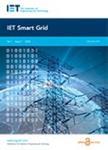版权所有:内蒙古大学图书馆 技术提供:维普资讯• 智图
内蒙古自治区呼和浩特市赛罕区大学西街235号 邮编: 010021

作者机构:Tsinghua Univ Dept Elect Engn Beijing Peoples R China Beijing Univ Posts & Telecommun Sch Comp Sci & Technol Beijing Peoples R China Univ Macau State Key Lab Internet Things Smart City Taipa Macau Sar Peoples R China
出 版 物:《IET SMART GRID》 (IET Smart Grid)
年 卷 期:2020年第3卷第6期
页 面:786-793页
核心收录:
基 金:National Key Research and Development Program of China [2016YFB0900100] National Natural Science Foundation of China [U1766205]
主 题:facilities planning iterative methods battery powered vehicles genetic algorithms electric vehicle charging PEV fast-charging stations plug-in electric vehicle long-lasting charging process facilities planning cost minimisation planning queuing driving time genetic algorithm waiting driving time charging queuing impacts iterative algorithm case analysis taxi trajectory data Beijing
摘 要:Fast charging is a promising way for plug-in electric vehicles (PEVs) to get recharged quickly and reduce the impacts of long-lasting charging process on PEV owners daily life. Decreasing time during charging PEVs also makes the decision of PEV owners choosing where to charge affected more by the time length of driving towards and waiting in charging stations, raising new requirements for charging facilities planning. In this study, a cost minimisation planning method of PEV fast-charging stations taking influences of queuing and driving time into consideration is proposed and solved by the genetic algorithm-based methodology. An iterative algorithm obtaining the equilibrium of the user s decision of place to charge is proposed to consider the impacts of waiting and driving time at different charging stations on PEV owners. The effectiveness of the proposed strategy is then verified through the case analysis based on trajectory data of taxis in Beijing, which shows that the proposed methodology has good performances in computation. Weight of time costs and investment restrictions such as the number of charging stations would also influence the planning result.